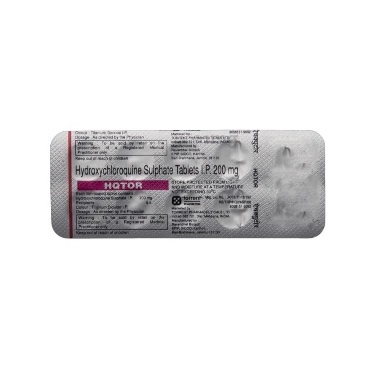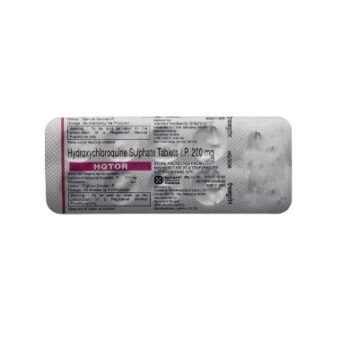HQTOR 200 mg, containing hydroxychloroquine sulfate, is prescribed for various conditions like malaria, rheumatoid arthritis, and lupus erythematosus. It works by suppressing the immune system and interfering with the growth of parasites responsible for malaria.
HQTOR 200 mg is also used to manage autoimmune diseases by reducing inflammation and joint pain. Administered orally, dosage is typically based on weight, medical condition, and response to treatment.
Regular medical check-ups and eye examinations are recommended during prolonged use to monitor side effects. Always follow your healthcare provider’s instructions and report any unusual symptoms promptly for optimal care.
Uses
HQTOR 200 mg is a medication containing hydroxychloroquine sulfate, primarily prescribed for:
- Malaria: It is effective against Plasmodium species, including chloroquine-resistant strains, preventing and treating malaria infections.
- Rheumatoid Arthritis: HQTOR 200 mg reduces joint inflammation and pain associated with rheumatoid arthritis, improving mobility and quality of life.
- Systemic Lupus Erythematosus (SLE): It helps manage symptoms of lupus, such as skin rashes, joint pain, and fatigue, by modulating the immune response.
- Photosensitivity Disorders: Used to reduce skin sensitivity to sunlight in conditions like polymorphous light eruption (PMLE) and solar urticaria.
- Off-label Uses: Occasionally prescribed for other autoimmune conditions and as a preventive measure for certain infections.
Benefits
HQTOR 200 mg, containing hydroxychloroquine sulfate, offers several benefits:
- Effective Against Malaria: It prevents and treats malaria infections, including chloroquine-resistant strains.
- Rheumatoid Arthritis Relief: Reduces joint inflammation and pain, improving mobility and quality of life.
- Lupus Management: Helps control symptoms of systemic lupus erythematosus (SLE), such as skin rashes and joint pain.
- Sun Sensitivity: Reduces skin sensitivity to sunlight in conditions like polymorphous light eruption.
- Versatile Off-label Uses: Occasionally prescribed for other autoimmune conditions and as a preventive measure.
How to use HQTOR 200 mg?
HQTOR 200 mg, containing hydroxychloroquine sulfate, is typically taken orally with food or milk to minimize stomach upset. The dosage depends on the condition being treated and your medical history.
For malaria prevention, it’s usually taken once weekly starting 2 weeks before exposure and continued for 4 to 8 weeks after leaving the area. For rheumatoid arthritis and lupus, daily doses are tailored to your weight and response.
Regular medical check-ups are crucial to monitor for side effects, including eye examinations due to rare but serious visual disturbances. Follow your doctor’s instructions carefully for optimal results.
How does it work?
HQTOR 200 mg contains hydroxychloroquine sulfate, which exerts its therapeutic effects through several mechanisms:
- Antimalarial Action: It accumulates within the acidic food vacuoles of Plasmodium parasites, raising pH levels and inhibiting crucial enzymes for their survival, effectively preventing and treating malaria infections.
- Anti-inflammatory Properties: HQTOR 200 mg suppresses the immune response by reducing the production of inflammatory cytokines, thereby alleviating symptoms of rheumatoid arthritis and systemic lupus erythematosus (SLE).
- Immunomodulation: It interferes with antigen presentation and Toll-like receptor signaling, modulating the immune system’s hyperactivity seen in autoimmune disorders.
- Photosensitivity Management: By unknown mechanisms, it reduces skin sensitivity to sunlight in conditions like polymorphous light eruption.
Side Effects
HQTOR 200 mg, containing hydroxychloroquine sulfate, may cause several side effects:
- Gastrointestinal Issues: Common symptoms include nausea, vomiting, diarrhea, and abdominal cramps.
- Skin Reactions: It can occasionally lead to rash, itching, or changes in skin pigmentation.
- Eye Problems: Rarely, serious side effects such as blurred vision, difficulty focusing, or retinal damage may occur. Regular eye examinations are recommended.
- Neurological Effects: Headache, dizziness, and mood changes may occur in some individuals.
- Cardiac Effects: Prolonged use may rarely cause cardiac arrhythmias.
- Blood Disorders: Hydroxychloroquine can affect blood cell counts, leading to anemia or low white blood cell count.
- Hypersensitivity Reactions: Allergic reactions like swelling of the face, lips, tongue, or throat may occur.
- Other: Muscle weakness, hair loss, and changes in taste or hearing have been reported.
Precautions
- Medical History: Inform your healthcare provider about any pre-existing medical conditions, especially:
- Eye Problems: Including retinal disease or visual disturbances.
- Heart Conditions: Such as arrhythmias or heart disease.
- Liver or Kidney Issues: Adjustments in dosage may be necessary.
- Skin Disorders: Especially if prone to dermatitis or psoriasis.
- Medication Interactions:
- Avoid Concurrent Use: Notify your doctor of all medications, vitamins, and herbal supplements being taken to prevent interactions, particularly drugs affecting heart rhythm.
- Pregnancy and Breastfeeding:
- Consultation Needed: Use in pregnancy or breastfeeding requires careful consideration, as it may affect fetal development or pass into breast milk.
- Eye Examinations:
- Regular Monitoring: Schedule periodic eye exams to detect potential retinal toxicity early, especially with prolonged use.
- Skin Sensitivity:
- Sun Protection: Take precautions against excessive sunlight exposure, as hydroxychloroquine can increase skin sensitivity.
- Children and old people :
- Special Considerations: Dosage adjustments may be necessary based on age-related factors and susceptibility to side effects.
- Allergic Reactions:
- Immediate Medical Attention: Report any signs of severe allergic reactions, such as swelling or difficulty breathing, to healthcare providers promptly.
- Monitoring:
- Regular Check-ups: Monitor blood cell counts, liver function, and overall health status regularly during treatment.
- Complete the Course:
- Adherence: Finish the prescribed course of HQTOR 200 mg as directed, even if symptoms improve, to prevent recurrence or resistance.
Things to tell the doctor before using it
Before starting HQTOR 200 mg, it’s crucial to inform your doctor about several key aspects of your health:
- Medical History: Any pre-existing conditions, especially eye disorders, heart conditions, liver or kidney disease, and skin issues.
- Current Medications: Including prescription drugs, over-the-counter medications, vitamins, and herbal supplements to avoid potential interactions.
- Allergies: Any known allergies or sensitivities, particularly to hydroxychloroquine sulfate or related medications.
- Pregnancy or Breastfeeding: If you are pregnant, planning to become pregnant, or breastfeeding, as the medication may impact fetal development or pass into breast milk.
- Previous Treatment Experiences: Any history of adverse reactions or problems with similar medications.
Conclusion
HQTOR 200 mg offers a multifaceted approach to managing conditions like malaria, rheumatoid arthritis, and lupus erythematosus. By addressing symptoms effectively while requiring careful consideration of individual health factors, it underscores the importance of informed medical supervision. Prioritizing patient safety and therapeutic efficacy, HQTOR 200 mg stands as a valuable treatment option for diverse medical needs.











Reviews
There are no reviews yet.